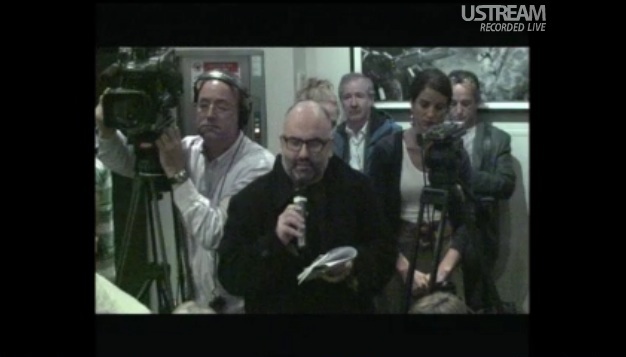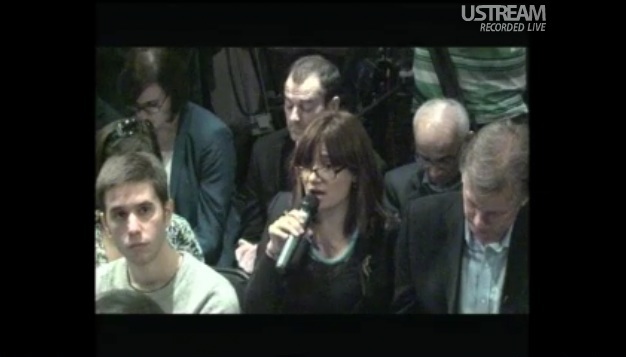Home » Industry Watch » The Technological
WikiLeaks: Crikey/Rundle Hit It Out of the ParkWith the bases loaded.
MELBOURNE (Rixstep/Radsoft) — 'Crikey is Australian for independent journalism', says the Crikey 'about page'. And one must wonder if they're the only source on the English language planet able to make good on such a boast.
Further down the same page one can read:
'Most importantly, Crikey is independent and is not part of a media empire.'
That could explain it. And judging from today's back-to-back home runs, they're good for it.
Crikey
A short essay of a mere 315 words kicks things off. The credit card companies VISA and MasterCard as well as online payment company PayPal are involved in an extralegal financial strangulation of WikiLeaks - which has 'demonstrated the strong identity of interest between some of the world's most important financial intermediaries and the US government'.
No mince of words there. So how do VISA, MasterCard, and PayPal justify their extralegal behaviour?
'The companies have never adequately explained why they have shut down donations to the WikiLeaks, given the lack of criminal charges.'
Perhaps they're acting out of 'moral duty'? Not quite.
'Indeed, illegal activity is not normally a bar to using the companies' payments systems. All three companies facilitate donations to Israeli settlement activity that is illegal under international law and even, in many cases, illegal under Israeli law.'
Goodness. So how can people hold the companies accountable?
'There is no mechanism for holding them to account for what are plainly wholly inconsistent approaches to who can use their services and who cannot. Instead, these companies persist in acting as arms of the US government, carrying out a 'proxy war' on WikiLeaks in the absence of any charges against the organisation.'
This would be a reference to 'rule of law' in any other context. And because VISA and MasterCard enjoy a near 100% monopoly, they are not entitled to be selective in their choice of clients. Crikey again.
The proxy war 'establishes the precedent for extralegal, nontransparent, extraterritorial attacks by governments operating through private corporations beyond the scope of normal accountability processes'.
Some might call that 'fascism'. Finally:
'As Guy Rundle points out, it also has implications that extend far beyond the whistle-blowing group, to any credit card carrying citizens, and the choices they make when it comes to what they spend their money on. Suddenly the humble cheque book doesn't seem so old fashioned.'
Indeed. Banks absolutely love the credit card industry: they get rid of most of their employees, they can relegate 'cash' to the past, they can perform sophisticated demographic (and personal) tracking nigh on impossible in a world of cash and cheques - they have a win-win situation for all. And they're undoubtedly grateful to VISA and MasterCard.
This realisation must of course beg the question whether the CC companies are bigger spies than even Facebook. The answer almost certainly has to be 'yes'. Given the massive unemployment in the US and the growing '#Occupy' movements against Wall Street and the banks, a reversion to cash and cheques would mean less tracking, more jobs, and significantly lower profits few people believe the banks are entitled to.
Onto Crikey's reporter in Big Smoke who yesterday demonstrated he's a journalist apart and today does it again.
Rundle
Guy Rundle, who recently incurred the wrath of the Grauniad's rabid hit man Nick
Davies (repeated outbursts such as 'you fucking cunt' and a splash of cheap white wine in his face) merely for showing up for a Heather Brooke/Grauniad event, was able to shame the other 157 'stenographers' at yesterday's WikiLeaks press conference at the Frontline Club in Paddington.

Rundle's question in two parts.
'Um Guy Rundle from Crikey. Um two related questions. Are you disappointed that PayPal joined the general blockade, given that it was founded by self-styled libertarians and purported to have an alternative approach to global financing and payment? And secondly: is what you're really saying that this is a crucial question about sovereignty and a question of an attack basically on European sovereignty by american institutions?'
And all Esther Addley could come with was 'existential'.

So today Rundle filed with Crikey. And where everyone else in the Jackal Media of the west skimmed over the conference and went with WikiLeaks being in trouble, Rundle began by 'accentuating the positive' as the song goes - and then by following up with just about every nuance and hint in the entire 60 minute presentation that made the eyes of the other 157 glaze over.
'The humble credit card is now a political tool', he began in his title, and then ran straight for the announcement of the long awaited new submissions system to be unveiled on the one year anniversary of Cablegate.
Rundle then brings readers up to date with the current situation, going through the graphs Kristinn Hrafnsson put up, and detailing the litigatory activities of the organisation for the next few months. And then he waxes political and into the 'bigger picture' as his questions intimated.
'Much of the campaign will hinge on the argument the payment blockade raises issues that extend far beyond WikiLeaks. The consolidation of banking systems and payment processes has given a handful of payment systems a near monopolistic control over day-to-day transactions across the world.'
Then:
'Assange noted that the issue was ultimately one of individual rights - the ban was not merely on WikiLeaks 'but on anyone who wanted to contribute to WikiLeaks, and to affiliate with it in that way'. It was a restriction on anyone who wanted to vote with their wallet.'
Then:
'Furthermore, it was also an issue of sovereignty. Since 97% of transactions now go through the big two credit cards and PayPal, the effect is that US corporations control the day-to-day economic interactions between two people in another country entirely.'
Existential, anyone? And still he's not finished. No other reporter came close to digging out the real stories yesterday. And Rundle didn't miss the technological payoff either.
'As regards the re-booting of the submission system - designed to be completely anonymous, so that not even WikiLeaks knows who has sent material in - Assange argued that the previous architecture was manifestly inadequate, attributed to the failings of the agencies certifying public encryption, due not least to their infiltration by spy agencies of various nations. A new submissions system had taken so long to complete because it had to bypass these processes altogether.'
This in contrast to various reports from the 157 yesterday that WikiLeaks would - as of yesterday - be curtailing further publication of US embassy cables.
And still Rundle is not through - he's got one more not so subtle point to make.
The 'new submission system may well be in place before OpenLeaks open for business'.
Ahem. And now - finally - it's time for the pub and that pint.
Crikey Readers Comments
The above could be an all-Australia phenomenon: even the readers comments exhibit an erudition not otherwise found in the sniveling robotic imperial West.
'Strange how Visa, PayPal, and MasterCard have no qualms about transferring funds to the Klu Klux Klan but WikiLeaks is somehow beyond the pale. Shameful intervention on the part of the big credit cards.'
- Brian Taylor
'Don't forget that in Australia our affair with electronic transactions is ubiquitous and long term. When I lived in Italy for many years cash was (and still is) totally king. People look at credit cards with mistrust and it's clear why.'
- JoanJett
Not that I am associating WikiLeaks with these organisations, but how do good old fashioned terrorist organisations like the IRA get their donations from their US supporters - or hasn't Paypal banned them?
- Mark from Melbourne
Costs according to WikiLeaks:
Legal: $1,200,000. Actually seems fairly reasonable considering they have 6 active cases in 6 different countries trying to overturn the credit card companies blockade. They also often have to get legal advice on publications.
Security: $300,000. Again considering how much their job requires anonymisation this seems reasonable. If we are talking network and computer security this is a cost of publication. If we are talking physical security of their computers this is still a cost of publication considering the business they are in.
Productions: $400,000. Hosting plus editing. Clearly a cost of publication.
Technical information: $500,000. Paying consultants to develop their systems and/or provide technical information on leaks. Clearly a cost of publication.
Publications research: $500,000. Clearly a cost of publication.
Salaries and expenses: $500,000. Assuming a 5-10 person team and travel expenses this seems reasonable. Paying staff is also a cost of publication.
Campaigns: $300,000. Well ok given the amount of publicity they get maybe they don't need to advertise to publish. But even then advertising has always been considered a cost by anyone selling a service.
Clearly all of those are costs associated with publishing leaks online while endeavouring to maintain the anonymity of their sources. None of those costs seem unreasonable.
- Steven Warren
Australia used to have the highest per capita incidence of independent newspapers in the world. Until a certain Keith Rupert Murdoch came along. He went on from destroying journalism in the Lucky Country to doing the same thing in the US and the UK. So much was in evidence yesterday in Paddington.
But it would seem that even if Rupert could kill the institution in Australia, he couldn't kill the ethic.

See Also
Crikey: The slow financial strangulation of WikiLeaks
Crikey: The humble credit card is now a political tool
See Also
Justice4Assange.com
Assange Defence Fund
WikiLeaks: Support WikiLeaks
The Police Protocol (Translated)
Rixstep: JA/WL (Assange/WikiLeaks)
Rixstep: Assange/WikiLeaks RSS Feed
Radsoft: Assange/WikiLeaks RSS Feed
|